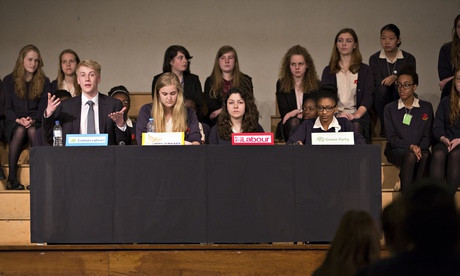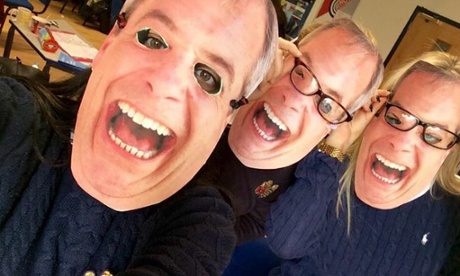
There are cheers of support for Nicole as she addresses fellow pupils at Bullers Wood School in the London borough of Bromley. The year 11 student, who is representing Labour in the school’s mock general election, speaks convincingly on everything from the economy to immigration. It’s clear the audience like her.
This Question Time style event follows weeks of campaigning by Nicole and representatives for the Green, Conservative and Liberal Democrat parties. There have been posters, hustings and even a lunchtime rally through the canteen. “We had a megaphone and music blasting, and massive amounts of cake. I actually think we got a couple of voters just from the cake,” she says.
Biscuits topped with blue icing went down well for the Conservative candidate, Simon. “I was surprised how many people took the leaflets, actually,” says the year 12 student and Young Conservatives member, who is keen to challenge the Tories’ image as the “nasty party”.
One of just 60 boys in a girls’ school (Bullers Wood takes boys in the sixth form), he’s also proving popular. “People liked the Conservative because he was funny,” says year 10 student Maisie.
But it isn’t all personality politics; the candidates’ knowledge of party policies – on everything from free schools to the environment – is impressive. The only question that fazes them in the debate is one about the “gentrification of London” (they all admit afterwards, they didn’t know what it meant). But they dodge it skilfully, like true politicians.
One thing they are keen to talk about is Ukip. No one at the school put themselves forward to represent the party. “I know a couple of people who were like, ‘Should I do it, should I not?’ and then they decided not to because they didn’t want people to be saying to them, ‘Why are you a racist?’” says Francesca, the year 11 student who is representing the Green party.
I mention that I’ve heard of a headteacher who has banned Ukip in her school election, and they think it’s a good idea. “I can understand it. A lot of their members seem to be advocating … less than nice views,” says year 11 student Frances. She’s representing the Liberal Democrats. The lack of support for Ukip at Bullers Wood is probably because it’s a state school, says Nicole. “My brother is in a private school and they’ve got quite a lot of people in Ukip.”
But if Passmores Academy in Harlow, Essex, is anything to go by, her theory is flawed. In its recent election, Ukip got 21% of the vote – not far behind the Conservatives at 24% and Labour at 27%.
Year 10 student Ben – who represented Ukip in the Passmores election – although he is keen to point out he is not a supporter – thinks young people’s political views are heavily influenced by the media. “I think most people who voted Ukip did so because of what they’d heard on TV. Ukip are a little bit controversial. I think people like that.”
The Passmores Liberal Democrat representative, Will, says some young people support Ukip because they think it’s funny. “For some people it’s just a bit of a laugh.”
The outcome of the Passmores election came as no surprise to headteacher Vic Goddard. “It’s a very white working class town. At the last local elections over half the candidates were Ukip.”

He admits he had reservations about having a Ukip candidate in the school election, but says excluding the party was out of the question. “They’re a recognised political party and we have to give a broad and balanced approach. But I’m kind of relieved they didn’t win.”
Geoff Barton, headteacher at King Edward VI School in Bury St Edmunds, Suffolk, agrees. “I see it as our job to help navigate young people through a complicated world. I don’t see how we can do that if we don’t expose them to different viewpoints. It was hard to find a student willing to represent Ukip – in the end we had to get our best actor to do it. But I think it’s definitely enriched the debate. I’ve never seen the kids so engaged.”
So why did Ros McMullen, executive principal of the David Young Community Academy in East Leeds, ban Ukip from her school election? “We’re a multi-faith academy with lots of refugee children. I just didn’t feel it was appropriate,” she says.
Ruth Fox, director of the Hansard Society – which has been running a national mock election scheme involving around 400 schools – isn’t surprised to hear Ukip is a hot issue. “Ukip is one of the mainstream parties, so we’d definitely say they should be included. But from what we’re hearing it’s quite polarised. Candidates are either embarrassed to represent the party or they’re representing the party really robustly.” The issues young people are talking most about in this election are immigration, the environment and votes at 16, she says.
This is backed up by research by the Citizenship Foundation, which, as part of its remit to help children understand their role in society, recently invited 1,750 children from primary schools to submit election manifestos. Over half cited the environment as being important to them. Around 100 were concerned about racism.
It’s a landslide victory for Labour at Bullers Wood, with the party gaining 42% of the vote and the Conservatives not even close at 25% – a surprise result in the Tory stronghold of Bromley. The Greens get 23% and the Liberal Democrats 10% of the vote. “I didn’t expect this at all, but a small corner of young Tory Bromley just turned Red,” says head of history, Julian Critchley.
But while young people are fired up about politics, they are unimpressed by politicians. “No one really likes politicians,” says Frances, and Nicole agrees. “They seem very slimy. A lot of promises are broken.”
Students from Watford Grammar School for Girls donned Farage masks in their mock election last week. “There’s so little substance in the policies, we thought we might win a few votes by making everyone laugh,” says year 12 student Hannah. But the party won just 1% of the vote.
“The Green party lady seems really good,” says Britnee, a Year 10 student from Passmores who is representing the Conservative party. But she can’t remember her name.
While there is general agreement that David Cameron looks like the most credible leader, forgetting which football team he supports has done him few favours among the schools electorate.
And the young people Education Guardian spoke to seem unimpressed by #milifandom – the online campaign started by a 17-year-old Ed Miliband fan which has attracted thousands of “Milifans”.
“Ooh no, I don’t think anyone fancies Ed Miliband,” says Anya, the Green party candidate at Passmores. “Nick Clegg is the best,” she adds, to a chorus of approval. Frances agrees: “One of my friends wanted to be in the Lib Dems because she likes Nick Clegg. She thinks he looks like a little teddy bear.”







